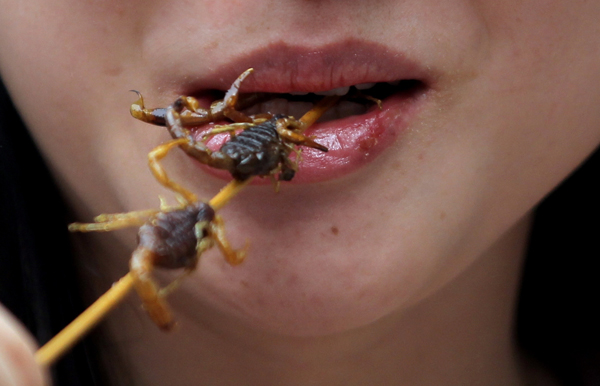A southern staple
 |
|
A woman eats fried scorpions in May on Wangfujing Street. It's said that scorpions lower body heat and detoxify the body. Wang Jing / China Daily |
 |
Xiao Feng, a resident of Guangzhou, said she was fed diving beetles when she was a child to strengthen her kidneys and better control urination.
Scorpions are often cooked in soup and recommended by traditional Chinese medicine doctors to cancer patients. Traditional Chinese medicine doctors believe the poison of the scorpion's stinger will combat the cancer, making the critter a key ingredient in TCM.
"We make scorpion soup every month on average but one cannot drink too much of it," said Chen Yingkui, another resident of Guangzhou.
Chen added that eating scorpions acts more as a preventative measure against illnesses than as a cure.
Though her diet is on the side of daring, she admits she still feels uneasy eating marine worms, which have multiple tiny feet, if they are not shredded and steamed with egg.
In the province, bamboo weevil larvae are available from October through February. It is a specialty in Guangning, where there are more than 72,000 hectares of bamboo forests.
Huang Zhongkang, former president of the Wuchuan TCM Hospital in Zhanjiang, said each aforementioned insect serves a specific purpose for the body.
Peanut worms strengthen the kidneys, but they should not be consumed if a person has a cold, fever, inflammation of the kidneys or an allergy. Scorpions clear and activate the main and vascular channels and treat headaches.
Though the insects may appear disgusting, that doesn't mean they come cheap. At a Guangzhou wet market, peanut worms were selling for 90 yuan a kilogram; cicada larvae, 240 yuan; cicada pupae, 280 yuan; black diving beetles, 80 yuan; scorpions, 760 yuan; and marine worms, 200 yuan.
Zhuang Na contributed to this story.
Related:
















